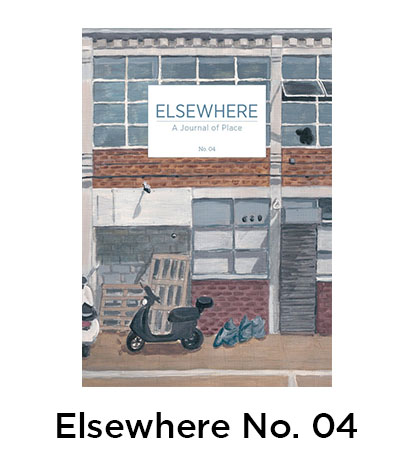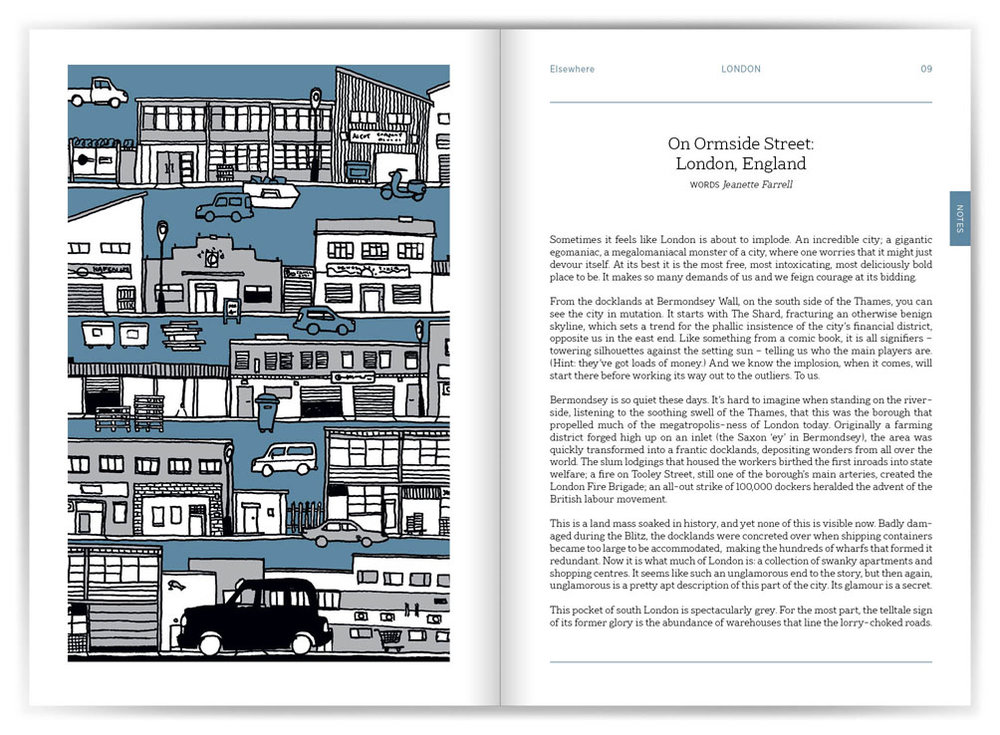We shall not cease from exploration
And the end of all our exploring
Will be to arrive where we started
And know the place for the first time.
T.S. Eliot, Little Gidding
I missed the first three editions of Elsewhere but, on the strength of this the fourth issue, I’m looking forward to delving back into each of them.
Elsewhere’s strap line is ‘a journal of place’, a very apt description of its contents. Edition 04, published in September 2016, delivers up writings on London, Wales, Madeira, Prague, Hawaii and a several other global locations. The pieces on offer are highly disparate, but all are unified by their adherence to a common theme: maps. What is the significance of maps and how are they created? What is it that they tell us about the places featured and what questions do they raise about the people who live there? These are the questions addressed in this edition.
Elsewhere is edited by Paul Scraton, an Englishman living in Berlin. There is no better place, perhaps, than the German capital in which to base a journal that embraces a global sense of place. Berlin, by consequence of its unique location and history, is not just a European crossroads but a world city: a cosmopolitan sorting house of connections.
I was brought up in Wales and many of my childhood holidays were spent in Anglesey, so Scraton’s essay reflecting on a return visit to Rhoscolyn, where he spent several summers as a child, was of particular interest to me.
American cartographer Jake Coolidge argues that maps shape our perception of place with such power that their authority is rarely questioned. But they are drawn by humans and are inevitably subject to the fixed assumptions and biases of their creators. This subjectivity is hard to avoid, but Coolidge encourages those using maps to at least approach the task with this knowledge in mind.
Daniel Reeve, on the other hand, consciously makes no effort to achieve the chimera that is objective reality. Reeve is a New Zealander and produces antique-style maps of imaginary places. The maps he created for the Lord of the Rings film trilogy and The Hobbit are amongst his best-known works.
Jeanette Farrell is an Irish writer living in South London who seems to delight in shining a light onto some of the forgotten corners of her adopted city. She writes about Ormside Street in Bermondsey and admits that ‘this packet of South London is spectacularly grey’. But a closer examination on foot leads her to conclude that the area is a ‘clandestine wonder’.
Stephen Glennon writes about a place that one might describe as a clandestine country. The Pridnestrovian Moldavian Republic is a self-declared independent nation squeezed into a slice of formerly Moldovan land between the Dniester River and the Ukraine. It is a state with no international recognition, but on a visit to its capital, Tiraspol, on Independence Day Glennon discovers a firm sense of national identity. His piece is accompanied by some striking images by the Italian photographer, Chiara Dazi.
Elsewhere is a journal that is about far more than just words. Our sense of place, our perception of the locations we visit, is rooted in all of our physical and cognitive senses. It is fitting, therefore, that Elsewhere is effectively brought to life by the work of its Creative Director and illustrator, Julia Stone. Stone’s illustrations do more than give the journal its unifying identity, though they happen to do that very effectively. Her key creative input is to pair each article with original images that add to its meaning.
The very word Elsewhere encompasses multiple layers of meaning. Many of the journal’s contributors write about an ‘elsewhere’ that they have visited. Others are exiles and, for them, ‘elsewhere’ has become their new home. Just as interesting, however, are the pieces provided by writers returning to a place they once knew, such as Paul Scraton’s essays on Rhoscolyn and Prague. In doing so he sees a once familiar place with a fresh pair of eyes. It is as if in going back somewhere we suddenly find it has become elsewhere.
You can buy your copy of Elsewhere here


